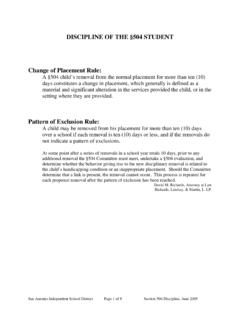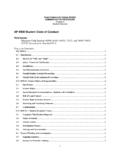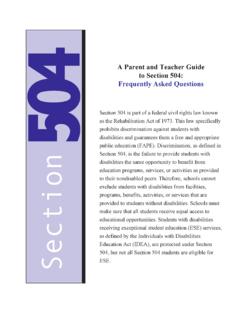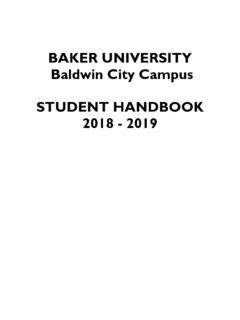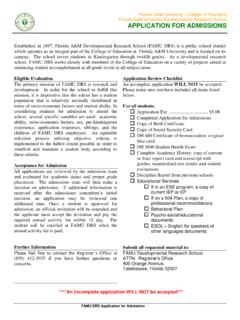Transcription of Comparison Table: Section 504 and IDEA 2004
1 Comparison table : Section 504 and IDEA 2004 Note. Adapted from Florida Department of Education (2006). Comparison table : Section 504 and IDEA 2004. Retrieved from Section 504 OF THE REHABILITATION ACT IDEA 2004 Year of Initial Enactment 1973 Legal Citation 29 USC 794 34 CFR Part 104 20 USC 1400 et seq. 34 CFR Part 300 and 303* * Subject to revision General Purpose A civil rights law that protects the rights of individuals with disabilities in programs and activities that receive federal financial assistance from the Department of Education. A federal funding statute whose purpose is to provide financial aid to states in their efforts to ensure adequate and appropriate educational services for children with disabilities. Individuals Covered Students with disabilities who meet the following definition: The individual (1) has or (2) has a record of a physical or mental impairment that substantially limits one or Infants and toddlers with disabilities birth through 2; children 3 through 21 who meet the definition of one of the specific disabilities applicable to school-age more major life activities or (3) is regarded as having such an impairment.
2 Major life activities include walking, seeing, hearing, speaking, breathing, learning, working, caring for one's self and performing manual tasks. The disability need only substantially limit one major life activity in order for the student to be eligible. children. Funding Does not provide additional funds. Provides federal funding for IDEA eligible students with disabilities. Program Access No qualified individual with a disability shall, because a recipient's facilities are inaccessible or unusable by disabled individuals, be denied the benefits of, be excluded from participation in, or otherwise be subjected to discrimination under any program or activity. Does not require recipients to make each of the existing facilities or every part of an existing facility accessible. The program may (1) redesign equipment, (2) reassign classes to accessible buildings, or (3) assign an aide, etc. with priority to those methods that offer programs and activities to disabled persons in the most integrated setting appropriate.
3 New construction or alterations after June 3, 1977 must be accessible. Each public agency shall take steps to provide academic and non-academic services and activities in such manner as is necessary to afford children with disabilities an equal opportunity for participation in those services and activities. Notice Requires notice to the parent or guardian with respect to identification, evaluation, and/or placement. Written notice not required, but indicated by good professional practice. Requires prior written notice to the parent or guardian with respect to identification, evaluation, placement, and/or FAPE. Delineates required components of written Requires notice only before a "significant change" in placement. notice. Consent Requires consent for evaluation if additional assessments are needed. Requires written, informed parental/guardian consent before conducting an initial evaluation or reevaluation of the child and before providing special education and related services to a child with a disability.
4 Responsibility to Provide a Free Appropriate Public Education (FAPE) Requires the provision of a free appropriate public education to eligible students covered under the law including specially designed instruction. Although a written plan is not specified, documentation of evaluation procedures and accommodation or service decisions is required. OCR does require a written plan to ensure FAPE. In addition, a written plan provides clarity and direction to individuals delivering services or making accommodations. A written plan is considered best professional practice. "Appropriate education," means an education with accommodations must be comparable to the education provided to non-disabled students. Related services may be the accommodations. Requires the provision of a free appropriate public education to eligible students covered under the law, including specially designed instruction and related services. Requires a written IEP document with specific content and specified participants at the IEP meeting.
5 "Appropriate education" means a program, including special instruction, designed to meet the student s individual needs and that meets the standards of the local education agency. Related services are provided if required for the student to benefit from specially designed instruction. Least Restrictive Environment (LRE) The student shall be placed in the general educational environment unless the child's education cannot be achieved satisfactorily even with the use of supplementary aids and The placement of students with disabilities in special classes, separate schools, or other removal from the general educational environment occurs only when the nature or severity of the disability is such that education in regular classes with services. the use of supplementary aids and services cannot be satisfactorily achieved. In addition, the placement must provide special education to the maximum extent appropriate to the needs of the student with other students who do not have a disability and be as close as possible to the student's home.
6 Members of decision making team Group of individuals knowledgeable about the student, evaluation results, and placement options. Specific membership of the IEP team is specified in IDEA 2004. Teams frequently consist of parent, evaluator, general education teacher, representative of local education agency, special education teacher, and others as invited. Evaluation Evaluation draws on information from a variety of sources in the area of concern; decisions made by a group knowledgeable about the student, evaluation data, and placement options. Requires notice, with written parental consent being best practice. A full comprehensive evaluation is required assessing all areas related to the suspected disability. An evaluation is administered by trained and knowledgeable personnel. Requires informed consent before an initial evaluation is conducted. Reevaluation Requires periodic reevaluations. A triennial schedule for reevaluation will suffice.
7 Reevaluation is required before a significant change in placement. No provision for independent evaluations at district expense. District should consider any evaluations presented. Reevaluation does not require a comprehensive evaluation. The reevaluation may be a review of current data on student Requires triennial reevaluation; review of existing data is used to determine what, if any, additional information is required. A reevaluation is not required before a significant change in placement, but a review of current data is recommended. Provides for independent educational evaluation at district expense if parent disagrees with evaluation obtained by progress. The 504 team determines if additional information is required. school district. Informed parental consent is required for administration of a formal assessment through the reevaluation process, unless school district can show parent did not respond to attempts made. Eligibility Procedures When evaluation data are interpreted and accommodation decisions made, the law requires the following: Draw upon information from a variety of sources Assure that all information is documented and considered Ensure that the eligibility decision is made by a group of persons including those who are knowledgeable about the child, the meaning of the evaluation data, and placement options When evaluation data are interpreted and placement decisions made, the law requires the following: Draw upon information from a variety of sources Assure that all information is documented and considered Ensure that the eligibility decision is made by a group of persons including those who are knowledgeable about the child, the meaning of the evaluation data, and placement options Placement Ensure that the student is educated with his/her non-disabled peers to the maximum extent appropriate, LRE.
8 Obtain parental consent prior to provision of special education and related services. Placement decision is based on IEP. Ensure that the student is educated with his/her non-disabled peers to the maximum extent appropriate LRE. Convene an IEP review meeting before any change in placement. Undue Hardship Size of the program and its budget, type of operation, nature and cost of accommodation. None Drug and Alcohol Use Schools may take disciplinary action pertaining to use or possession of illegal drugs or alcohol against any student to the same extent such disciplinary action is taken against students who are not disabled. No due process procedures are required for students currently engaged in the illegal use of drugs or alcohol. Civil rights protections under Section 504 apply. Protection Against Retaliation Incorporates prohibition against retaliation, intimidation, coercion, threats, and discrimination found in regulations under Title VI of Civil Rights Act.
9 Civil rights protections under Section 504 apply. Self-Evaluation by Recipient Requires recipients to conduct a self-evaluation to identify discriminatory policies and practices. None Internal Grievance Procedure Requires districts with 15 or more employees to designate a Section 504 compliance officer and a grievance procedure to investigate complaints alleging noncompliance with Section 504. State complaint procedures required. Prior to due process, district must offer early resolution. Discipline District should review all pertinent data regarding the child prior to any disciplinary removal for more than 10 days. Is the behavior caused by the student's disability? If "yes," the child may not be removed for more than 10 consecutive school days unless the behavior is drug/alcohol related. If determined behavior was not a manifestation of the disability, the student may be disciplined the same way the Any disciplinary removal of more than 10 consecutive days is a significant change of placement triggering the procedural the safeguards of IDEA, including the right to remain in the current educational placement pending appeal.
10 Cumulative removals of more than 10 school days within the school year may be considered a change of placement and thus trigger student without a disability is disciplined. procedural safeguards under IDEA. FAPE cannot be terminated as a disciplinary measure. Due Process Requires districts to provide impartial hearings for parents or guardians who disagree with the identification, evaluation, or placement of a student. Requires that the parent have an opportunity to participate and be represented by counsel. Other details are left to the discretion of the local school district. Policy statements should clarify specific details. Requires districts to provide due process hearings for parents or guardians who disagree with the identification, evaluation, or placement of a student. Delineates specific requirements. Exhaustion Administrative hearing not required prior to OCR involvement or court action; compensatory damages possible.
